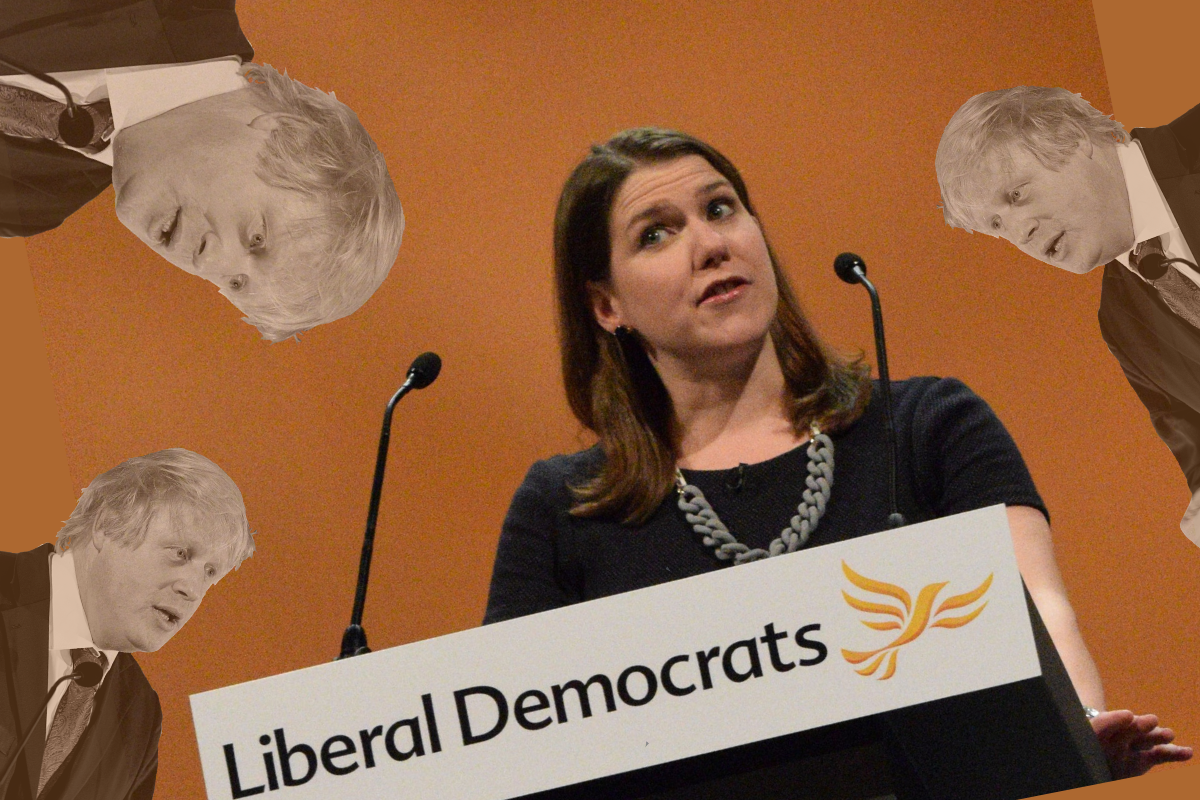
Composite image via Wikimedia Commons/Keith Edkins and Flickr/Financial Times
Ahead of an historic general election in the UK, the Liberal Democrats party have jumped at the opportunity to haul in ardent pro-Europeans and floating voters. In particular the young, liberal, white, middle class electorate seems to be a growing Lib Dem faithful group, and the election campaign has already turned into a Brexit war, with parties debating on strong Remain/Leave lines.
However, before we head to the polls this December, it feels increasingly important to lay out some facts about tactical voting and the reality of Lib Dem politics that might seem a neutral option for many voters. In reality, the Lib Dems are not the social democratic party that they might have been in the early noughties under Charles Kennedy, an eminent centre-left politician who opposed identity cards and the Iraq War.
“Voting Lib Dem as a protest against Brexit will only facilitate Tory gains”
The prospect of a Remain party governing either locally or nationally with a commitment to stay in the EU come rain or shine may be appealing to all of us who reject a Boris Johnson-style hard Brexit, but voting Lib Dem is an ineffective strategy. The UK appears to have veered ever further towards a “two-party system”, where voters essentially are forced to choose between two main parties occupying opposing political positions. Because of this, voting Lib Dem as an alternative to the Conservative and Labour parties, or as a protest against Brexit in general, will only facilitate Tory gains.
Tactical voting has been promoted by many vocal Remainers, including the Best for Britain campaign which frequently advises backing Lib Dems in marginal Labour seats across the UK. This information is misleading; in many cases it has advised voting Lib Dem in constituencies where there is little chance of them winning. In total, it recommends voting for around 180 Lib Dem MPs in marginal seats, whereas other tactical voting sites such as Remain United, led by businesswoman Gina Miller, have suggested that only 33 Lib Dems are likely to win any seats across the UK, provided there’s enough tactical voting going on to tip the balance. The Best for Britain tool has faced criticism on many fronts, being described as “bogus” by a senior Labour party source, who rightly identified that following this website’s advice “makes Johnson’s sell-out Brexit deal more likely”.
“Backing Labour is the most sensible way to block a Tory-style hard Brexit”
With the Lib Dems currently polling at around 15% nationwide, and given that they only have 21 MPs in Parliament, a Lib Dem majority is incredibly unlikely. If they score any gains at all this December, a coalition (which they have so far rejected with the two major parties) and a subsequent second referendum is the only feasible outcome, and both of these are again, unlikely. This can only mean that if you are a Remainer, backing Labour and their Brexit plan (which is arguably a stronger and more cohesive policy than that of the Lib Dems) is the most sensible way to block a Tory-style hard Brexit, or worse, a Tory and Brexit party coalition and the associated chaos this collaboration would bring. Such a pairing is looking worryingly possible, given the Brexit Party’s decision to stand down in 317 Tory-held seats in order to keep as many Leave MPs as possible in Parliament.
It is now more important than ever to kick out the Tories from Downing Street and minimise their numbers in Parliament, and the only way to do this is for all Remainers to unite behind Labour and back their Brexit plan.
Closer examination of Lib Dem leader Jo Swinson’s voting record reveals her less-than progressive stance on almost everything except Brexit. Despite branding herself as a feminist icon in the upcoming election — calling Jeremy Corbyn and Boris Johnson “sexist” and pushing leaders to #DebateHer (but failing to acknowledge other party leaders that are women such as Siân Berry and Nicola Sturgeon) — it’s hard to imagine Jo as someone who’s that concerned about womens’ lives when she consistently voted for the introduction of “austerity” – wide scale public funding cuts – during the Conservative-Lib Dem coalition government (2010-2015). Described by the UN as inflicting “great misery” on UK citizens, austerity was and continues to be a policy which disproportionately disadvantages women, working class people and people of colour. It should therefore not be forgotten that during the coalition government, the Lib Dems were involved in decimating Britain’s public services, leading to 130,000 preventable deaths, with Jo voting 26 times against increased welfare spending.
“Jo’s history of backing raised university tuition fees — something which has plunged so many into debt, is a clear indication of her party’s removed stance on crucial social reform”
How far the Lib Dems have fallen from being a liberal safe haven. Jo’s history of backing raised university tuition fees — something which has plunged so many into debt, is a clear indication of her party’s removed stance on crucial social reform. But how surprising is this really? She is yet to publicly condemn the Windrush scandal, and despite championing a performative pro-environment stance in the run up to this election in order to capitalise on youth votes, has backed proposals to sell England’s state owned forests and refused to get behind plans allowing carbon dioxide emissions limits to be set.
Just like people who “don’t see colour” and “wish we could all just get along”, the Lib Dems aim to offer a vision of Britain as a “free and open society”, rather than one divided by “left and right”. At this point, however, the party really doesn’t have a leg to stand on, when they have become a refuge for ex-Tory politicians such as Phillip Lee, who is hardly “open” to many things, given he proposed to ban people with HIV or Hepatitis B from entering the UK in 2014. Likewise, how “open” is Lib Dem MP Angela Smith to people of colour when she referred to us as having a “funny tinge” on live TV?
Charles Kennedy and the centre-left are long-gone, and since the coalition government, the Lib Dems have come to embrace all that they once rejected. At the heart of their plans to prevent Brexit, the Lib Dems are happy to help defeat Labour politicians by refusing to stand down in vital marginals such as Canterbury, making Tory gains all the more likely.
It’s time to stop pretending that the Lib Dems are a progressive party. If we believe in blocking a hard Brexit, whilst investing in housing, public services, and stopping the selling out of our NHS, we must vote Labour next month. Although their dodgy bar charts might have you believe otherwise, make no mistake: a vote for the Lib Dems in almost any UK constituency will help Boris Johnson remain in Downing Street, validating ever rising pro-establishment Tory sentiment, blatant racism and the continual neglect of the housing and ecological crises. We’ve seen the impacts of disastrous Universal Credit and draconian immigration policies — all of which the Lib Dems (and their nonconformist cohort) claim to be so vehemently against — so let’s use our vote to make a change, rather than hand the UK over to the Tories.









